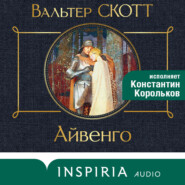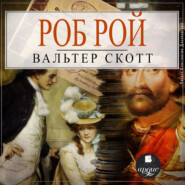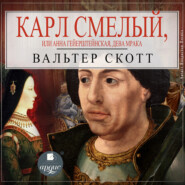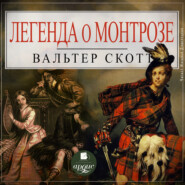По всем вопросам обращайтесь на: info@litportal.ru
(©) 2003-2024.
✖
Old Mortality, Complete
Настройки чтения
Размер шрифта
Высота строк
Поля
“That is not my man,” said Bothwell.
“John Balfour, called Burley, aquiline nose, red-haired, five feet eight inches in height”—“It is he—it is the very man!” said Bothwell,—“skellies fearfully with one eye?”
“Right,” continued Grahame, “rode a strong black horse, taken from the primate at the time of the murder.”
“The very man,” exclaimed Bothwell, “and the very horse! he was in this room not a quarter of an hour since.”
A few hasty enquiries tended still more to confirm the opinion, that the reserved and stern stranger was Balfour of Burley, the actual commander of the band of assassins, who, in the fury of misguided zeal, had murdered the primate, whom they accidentally met, as they were searching for another person against whom they bore enmity. [Note: One Carmichael, sheriff-depute in Fife, who had been active in enforcing the penal measures against non-conformists. He was on the moors hunting, but receiving accidental information that a party was out in quest of him, he returned home, and escaped the fate designed for him, which befell his patron the Archbishop.] In their excited imagination the casual rencounter had the appearance of a providential interference, and they put to death the archbishop, with circumstances of great and cold-blooded cruelty, under the belief, that the Lord, as they expressed it, had delivered him into their hands.
[Note: Murderers of Archbishop Sharpe. The leader of this party was David Hackston, of Rathillet, a gentleman of ancient birth and good estate. He had been profligate in his younger days, but having been led from curiosity to attend the conventicles of the nonconforming clergy, he adopted their principles in the fullest extent. It appears, that Hackston had some personal quarrel with Archbishop Sharpe, which induced him to decline the command of the party when the slaughter was determined upon, fearing his acceptance might be ascribed to motives of personal enmity. He felt himself free in conscience, however, to be present; and when the archbishop, dragged from his carriage, crawled towards him on his knees for protection, he replied coldly, “Sir, I will never lay a finger on you.” It is remarkable that Hackston, as well as a shepherd who was also present, but passive, on the occasion, were the only two of the party of assassins who suffered death by the hands of the executioner.
On Hackston refusing the command, it was by universal suffrage conferred on John Balfour of Kinloch, called Burley, who was Hackston’s brother-in-law. He is described “as a little man, squint-eyed, and of a very fierce aspect.”—“He was,” adds the same author, “by some reckoned none of the most religious; yet he was always reckoned zealous and honest-hearted, courageous in every enterprise, and a brave soldier, seldom any escaping that came into his hands. He was the principal actor in killing that arch-traitor to the Lord and his church, James Sharpe.” See Scottish Worthies. 8vo. Leith, 1816. Page 522.]
“Horse, horse, and pursue, my lads!” exclaimed Cornet Grahame; “the murdering dog’s head is worth its weight in gold.”
CHAPTER V
Arouse thee, youth!—it is no human call—
God’s church is leaguer’d—haste to man the wall;
Haste where the Redcross banners wave on high,
Signal of honour’d death, or victory!
James Duff.
Morton and his companion had attained some distance from the town before either of them addressed the other. There was something, as we have observed, repulsive in the manner of the stranger, which prevented Morton from opening the conversation, and he himself seemed to have no desire to talk, until, on a sudden, he abruptly demanded, “What has your father’s son to do with such profane mummeries as I find you this day engaged in?”
“I do my duty as a subject, and pursue my harmless recreations according to my own pleasure,” replied Morton, somewhat offended.
“Is it your duty, think you, or that of any Christian young man, to bear arms in their cause who have poured out the blood of God’s saints in the wilderness as if it had been water? or is it a lawful recreation to waste time in shooting at a bunch of feathers, and close your evening with winebibbing in public-houses and market-towns, when He that is mighty is come into the land with his fan in his hand, to purge the wheat from the chaff?”
“I suppose from your style of conversation,” said Morton, “that you are one of those who have thought proper to stand out against the government. I must remind you that you are unnecessarily using dangerous language in the presence of a mere stranger, and that the times do not render it safe for me to listen to it.”
“Thou canst not help it, Henry Morton,” said his companion; “thy Master has his uses for thee, and when he calls, thou must obey. Well wot I thou hast not heard the call of a true preacher, or thou hadst ere now been what thou wilt assuredly one day become.”
“We are of the presbyterian persuasion, like yourself,” said Morton; for his uncle’s family attended the ministry of one of those numerous presbyterian clergymen, who, complying with certain regulations, were licensed to preach without interruption from the government. This indulgence, as it was called, made a great schism among the presbyterians, and those who accepted of it were severely censured by the more rigid sectaries, who refused the proffered terms. The stranger, therefore, answered with great disdain to Morton’s profession of faith.
“That is but an equivocation—a poor equivocation. Ye listen on the Sabbath to a cold, worldly, time-serving discourse, from one who forgets his high commission so much as to hold his apostleship by the favour of the courtiers and the false prelates, and ye call that hearing the word! Of all the baits with which the devil has fished for souls in these days of blood and darkness, that Black Indulgence has been the most destructive. An awful dispensation it has been, a smiting of the shepherd and a scattering of the sheep upon the mountains—an uplifting of one Christian banner against another, and a fighting of the wars of darkness with the swords of the children of light!”
“My uncle,” said Morton, “is of opinion, that we enjoy a reasonable freedom of conscience under the indulged clergymen, and I must necessarily be guided by his sentiments respecting the choice of a place of worship for his family.”
“Your uncle,” said the horseman, “is one of those to whom the least lamb in his own folds at Milnwood is dearer than the whole Christian flock. He is one that could willingly bend down to the golden-calf of Bethel, and would have fished for the dust thereof when it was ground to powder and cast upon the waters. Thy father was a man of another stamp.”
“My father,” replied Morton, “was indeed a brave and gallant man. And you may have heard, sir, that he fought for that royal family in whose name I was this day carrying arms.”
“Ay; and had he lived to see these days, he would have cursed the hour he ever drew sword in their cause. But more of this hereafter—I promise thee full surely that thy hour will come, and then the words thou hast now heard will stick in thy bosom like barbed arrows. My road lies there.”
He pointed towards a pass leading up into a wild extent of dreary and desolate hills; but as he was about to turn his horse’s head into the rugged path, which led from the high-road in that direction, an old woman wrapped in a red cloak, who was sitting by the cross-way, arose, and approaching him, said, in a mysterious tone of voice, “If ye be of our ain folk, gangna up the pass the night for your lives. There is a lion in the path, that is there. The curate of Brotherstane and ten soldiers hae beset the pass, to hae the lives of ony of our puir wanderers that venture that gate to join wi’ Hamilton and Dingwall.”
“Have the persecuted folk drawn to any head among themselves?” demanded the stranger.
“About sixty or seventy horse and foot,” said the old dame; “but, ewhow! they are puirly armed, and warse fended wi’ victual.”
“God will help his own,” said the horseman. “Which way shall I take to join them?”
“It’s a mere impossibility this night,” said the woman, “the troopers keep sae strict a guard; and they say there’s strange news come frae the east, that makes them rage in their cruelty mair fierce than ever—Ye maun take shelter somegate for the night before ye get to the muirs, and keep yoursell in hiding till the grey o’ the morning, and then you may find your way through the Drake Moss. When I heard the awfu’ threatenings o’ the oppressors, I e’en took my cloak about me, and sate down by the wayside, to warn ony of our puir scattered remnant that chanced to come this gate, before they fell into the nets of the spoilers.”
“Have you a house near this?” said the stranger; “and can you give me hiding there?”
“I have,” said the old woman, “a hut by the way-side, it may be a mile from hence; but four men of Belial, called dragoons, are lodged therein, to spoil my household goods at their pleasure, because I will not wait upon the thowless, thriftless, fissenless ministry of that carnal man, John Halftext, the curate.”
“Good night, good woman, and thanks for thy counsel,” said the stranger, as he rode away.
“The blessings of the promise upon you,” returned the old dame; “may He keep you that can keep you.”
“Amen!” said the traveller; “for where to hide my head this night, mortal skill cannot direct me.”
“I am very sorry for your distress,” said Morton; “and had I a house or place of shelter that could be called my own, I almost think I would risk the utmost rigour of the law rather than leave you in such a strait. But my uncle is so alarmed at the pains and penalties denounced by the laws against such as comfort, receive, or consort with intercommuned persons, that he has strictly forbidden all of us to hold any intercourse with them.”
“It is no less than I expected,” said the stranger; “nevertheless, I might be received without his knowledge;—a barn, a hay-loft, a cart-shed,—any place where I could stretch me down, would be to my habits like a tabernacle of silver set about with planks of cedar.”
“I assure you,” said Morton, much embarrassed, “that I have not the means of receiving you at Milnwood without my uncle’s consent and knowledge; nor, if I could do so, would I think myself justifiable in engaging him unconsciously in danger, which, most of all others, he fears and deprecates.”
“Well,” said the traveller, “I have but one word to say. Did you ever hear your father mention John Balfour of Burley?”
“His ancient friend and comrade, who saved his life, with almost the loss of his own, in the battle of Longmarston-Moor?—Often, very often.”
“I am that Balfour,” said his companion. “Yonder stands thy uncle’s house; I see the light among the trees. The avenger of blood is behind me, and my death certain unless I have refuge there. Now, make thy choice, young man; to shrink from the side of thy father’s friend, like a thief in the night, and to leave him exposed to the bloody death from which he rescued thy father, or to expose thine uncle’s wordly goods to such peril, as, in this perverse generation, attends those who give a morsel of bread or a draught of cold water to a Christian man, when perishing for lack of refreshment!”
A thousand recollections thronged on the mind of Morton at once. His father, whose memory he idolized, had often enlarged upon his obligations to this man, and regretted, that, after having been long comrades, they had parted in some unkindness at the time when the kingdom of Scotland was divided into Resolutioners and Protesters; the former of whom adhered to Charles II. after his father’s death upon the scaffold, while the Protesters inclined rather to a union with the triumphant republicans. The stern fanaticism of Burley had attached him to this latter party, and the comrades had parted in displeasure, never, as it happened, to meet again. These circumstances the deceased Colonel Morton had often mentioned to his son, and always with an expression of deep regret, that he had never, in any manner, been enabled to repay the assistance, which, on more than one occasion, he had received from Burley.
To hasten Morton’s decision, the night-wind, as it swept along, brought from a distance the sullen sound of a kettle-drum, which, seeming to approach nearer, intimated that a body of horse were upon their march towards them.
“It must be Claverhouse, with the rest of his regiment. What can have occasioned this night-march? If you go on, you fall into their hands—if you turn back towards the borough-town, you are in no less danger from Cornet Grahame’s party.—The path to the hill is beset. I must shelter you at Milnwood, or expose you to instant death;—but the punishment of the law shall fall upon myself, as in justice it should, not upon my uncle.—Follow me.”
Burley, who had awaited his resolution with great composure, now followed him in silence.
The house of Milnwood, built by the father of the present proprietor, was a decent mansion, suitable to the size of the estate, but, since the accession of this owner, it had been suffered to go considerably into disrepair. At some little distance from the house stood the court of offices. Here Morton paused.
“I must leave you here for a little while,” he whispered, “until I can provide a bed for you in the house.”
“I care little for such delicacy,” said Burley; “for thirty years this head has rested oftener on the turf, or on the next grey stone, than upon either wool or down. A draught of ale, a morsel of bread, to say my prayers, and to stretch me upon dry hay, were to me as good as a painted chamber and a prince’s table.”
It occurred to Morton at the same moment, that to attempt to introduce the fugitive within the house, would materially increase the danger of detection. Accordingly, having struck a light with implements left in the stable for that purpose, and having fastened up their horses, he assigned Burley, for his place of repose, a wooden bed, placed in a loft half-full of hay, which an out-of-door domestic had occupied until dismissed by his uncle in one of those fits of parsimony which became more rigid from day to day. In this untenanted loft Morton left his companion, with a caution so to shade his light that no reflection might be seen from the window, and a promise that he would presently return with such refreshments as he might be able to procure at that late hour. This last, indeed, was a subject on which he felt by no means confident, for the power of obtaining even the most ordinary provisions depended entirely upon the humour in which he might happen to find his uncle’s sole confidant, the old housekeeper. If she chanced to be a-bed, which was very likely, or out of humour, which was not less so, Morton well knew the case to be at least problematical.
Cursing in his heart the sordid parsimony which pervaded every part of his uncle’s establishment, he gave the usual gentle knock at the bolted door, by which he was accustomed to seek admittance, when accident had detained him abroad beyond the early and established hours of rest at the house of Milnwood. It was a sort of hesitating tap, which carried an acknowledgment of transgression in its very sound, and seemed rather to solicit than command attention. After it had been repeated again and again, the housekeeper, grumbling betwixt her teeth as she rose from the chimney corner in the hall, and wrapping her checked handkerchief round her head to secure her from the cold air, paced across the stone-passage, and repeated a careful “Wha’s there at this time o’ night?” more than once before she undid the bolts and bars, and cautiously opened the door.
“This is a fine time o’ night, Mr Henry,” said the old dame, with the tyrannic insolence of a spoilt and favourite domestic;—“a braw time o’ night and a bonny, to disturb a peaceful house in, and to keep quiet folk out o’ their beds waiting for you. Your uncle’s been in his maist three hours syne, and Robin’s ill o’ the rheumatize, and he’s to his bed too, and sae I had to sit up for ye mysell, for as sair a hoast as I hae.”

















